Star Wars: Customizable Card Game (SW:CCG) is an out-of-print customizable card game based on the Star Wars fictional universe. It was created by Decipher, Inc., which also produced the Star Trek Customizable Card Game and The Lord of the Rings Trading Card Game. The game was produced from December 1995 until December 2001. Since 2002, the game has been maintained by the Star Wars CCG Players Committee, with new virtual cards being released every few months and the capability to play both in person and online.
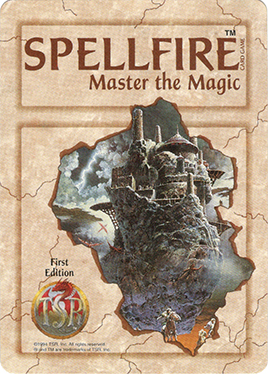
Spellfire: Master the Magic is an out-of-print collectible card game (CCG) created by TSR, Inc. and based on their popular Dungeons & Dragons role playing game. The game appeared first in April 1994, shortly after the introduction of Magic: The Gathering, in the wake of the success enjoyed by trading card games. It was the second CCG to be released, preceding Wizards of the Coast's second CCG Jyhad by two months.
Vampire: The Eternal Struggle is a multiplayer collectible card game published by White Wolf Publishing. It is set in the World of Darkness and is based on the Vampire: The Masquerade roleplaying game.

Middle-earth Collectible Card Game (MECCG) is an out-of-print collectible card game released by Iron Crown Enterprises in late 1995. It is the first CCG based on J.R.R. Tolkien's fictional universe of Middle-earth, with added content from ICE's Middle-earth Role Playing Game.
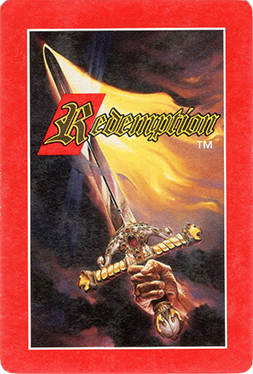
Redemption is a collectible card game based on the Bible. It involves Biblical characters, places, objects, and ideas. The object of the game is for players to use their Heroes to rescue Lost Souls by defeating their opponent's Evil Characters, with the first player to rescue five Lost Souls winning the game. Redemption was first published in July 1995 by Cactus Game Design and its creator, Rob Anderson, continues to develop and produce the game and is the final authority on rulings.
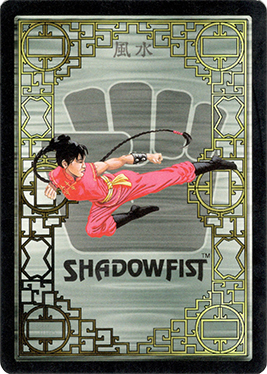
Shadowfist was created by Robin Laws and Jose Garcia. It was released in June 1995 as a collectible card game (CCG), but was shifted to a fixed distribution of cards as of 2013. It shares the same background as the Feng Shui, a role-playing game created by Laws and Garcia and released the following year. In September 2018 ownership of Shadowfist switched to Vetusta Games.

Dragon Ball Z Trading Card Game is an out-of-print trading card game based on the Dragon Ball series created by Akira Toriyama. The game was produced by Score Entertainment and uses screen captures of the anime to attempt to recreate the famous events and battles seen in the anime. Score then sold the rights to Panini which eventually ceased publishing.

The Robotech Collectible Card Game (CCG) is an out-of-print collectible card game produced by Hero Factory that is set against the science fiction backdrop of Robotech. Cards are based on characters and mecha from this popular anime. After a limited public beta testing period, the game debuted at Anime Expo in 2006.
Gundam War: Mobile Suit Gundam the Card Game also known simply as Gundam War is an out-of-print collectible card game based on the Gundam anime series produced by Bandai. Players can simulate battles in the anime series. The game is designed for 2 players, though there may be different fan-created multiplayer rules. This game is sometimes confused with the Gundam M.S. War Trading Card Game, since both are published by Bandai and are based on the Gundam series.

Mark Poole is an American fantasy artist, best known for working on the first set of Magic: the Gathering cards.

Super Deck! is an out-of-print super hero collectible card game designed by Marc Miller and produced by Card Sharks in 1994.

Galactic Empires is an out-of-print collectible card game with a science fiction theme. It was published by Companion Games in 1994 until the company's bankruptcy in 1997.

Battlestar Galactica Collectible Card Game is an out-of-print collectible card game based on the Battlestar Galactica science fiction media franchise. The game, published by WizKids, saw first release in May 2006 and was officially canceled in March 2007.

The Dragon Ball Collectible Card Game is a collectible card game based on the Dragon Ball franchise, first published by Bandai on July 18, 2008.
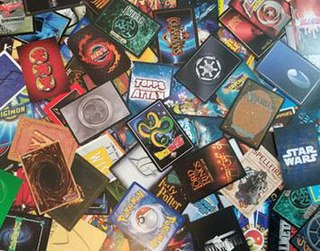
A collectible card game (CCG), also called a trading card game (TCG) among other names, is a type of card game that mixes strategic deck building elements with features of trading cards, introduced with Magic: The Gathering in 1993.

The BattleTech Trading Card Game is an out-of-print collectible card game (CCG) set in the BattleTech universe. The game was developed by Wizards of the Coast (WotC) for FASA and released in 1996.
A sideboard, side deck, or side is a set of cards in a collectible card game that are separate from a player's primary deck. It is used to customize a match strategy against an opponent by enabling a player to change the composition of the playing deck.
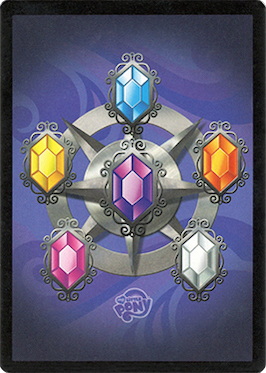
The My Little Pony Collectible Card Game is a two-player collectible card game based on the animated television series My Little Pony: Friendship Is Magic. It is produced by Enterplay LLC under license from Hasbro, and follows from Enterplay's previous work to produce a trading card series based on the same show.

A digital collectible card game (DCCG) or online collectible card game (OCCG) is a computer or video game that emulates collectible card games (CCG) and is typically played online or occasionally as a standalone video game. Many DCCGs are types of digital tabletop games and follow traditional card game-style rules, while some DCCGs use alternatives for cards and gameboards, such as icons, dice and avatars. Originally, DCCGs started out as replications of a CCG's physical counterpart, but many DCCGs have foregone a physical version and exclusively release as a video game, such as with Hearthstone.















